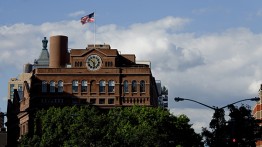A Message from Dean Tehrani - March 30 COVID-19 Update
POSTED ON: March 30, 2020

Mario Morgado
Dear Members of the Faculty and Student Body:
I wanted to communicate with you now, after the productive discussions in the all-faculty and all-student meetings, to share a few sentiments.
First and foremost, I want to thank you all for your attendance in these meetings. As physical proximity becomes more impossible, your virtual voice becomes all the more important. In the faculty meeting, I heard certain voices that are usually more reserved, and with an eloquence and generosity only befitting of this very moment we are all experiencing. I thank the faculty for their patience, thoughtfulness, and flexibility to take on critical positions that have vast implications on questions of ethics, care, community and learning that are so important at this time. Your ability to frame ‘what is important’ in our current predicament has been illuminating, and has offered us a vision of how to craft a path that is not only generous to the students, but also deliberate in identifying exceptions to the principles for which we stand.
Secondly, I thank the students, who in their capacity as members of varied committees, and as a total body have shown even more patience as we have navigated through a fortnight filled with uncertainty, with many of you relocating across multiple time zones. You have been articulate in your agency, clear in your requests, and well-framed in all arguments. With many uncertainties yet ahead, I hope that we may do justice to your requests, both individual and collective. In speaking with President Sparks, I am aware that your discussions with her have been productive, and that several issues stand to be worked out as we better understand the timing of when the buildings can reopen. The important thing is that we work these things out together, in dialogue. As we collaborate to address our weekly challenges, I want to remind you that the faculty are engaged in the very same process as you are. This is an entirely new phenomenon for them too, and they are committed to working hard and being creative to make sure that they engage you in a compelling remainder of the semester. I hope we can all acknowledge that and support our faculty as they work hard to support us.
Thirdly, speaking to the actual content of these meetings, I am in support of the suggested all-pass policy, if only that it affords all of us the trust and space to prioritize health and safety, while maintaining focus on the pressing academic issues of the moment - good communication, critical pedagogies, experimentation and exploration: all of this, in the space of new media, some of which does not readily accept the fluency with which we have come to explore form, space and materials. In turn, we will be working closely with all students on externalities that help them in job searches, graduate and fellowship applications, and their general interface with the world. Again, while I acknowledge that the all-pass policy may not fit every class, I am also determined to work with the Thesis students to address their varied needs.
Finally, let me reiterate that this is still just a beginning. Studios and classes are all set to be launched today. We have much to learn from this process, a lot to tweak and equally so much to communicate as we discover possibilities from which everyone else might benefit. Let us begin that process together now.
From a personal perspective, I want to communicate a special thanks to the students for the warmth of their sentiments in the student meeting. It means a lot to me, and I think I speak for the entire faculty when I say that we are proud to be in the hands of such a student body!
Best,
Nader




